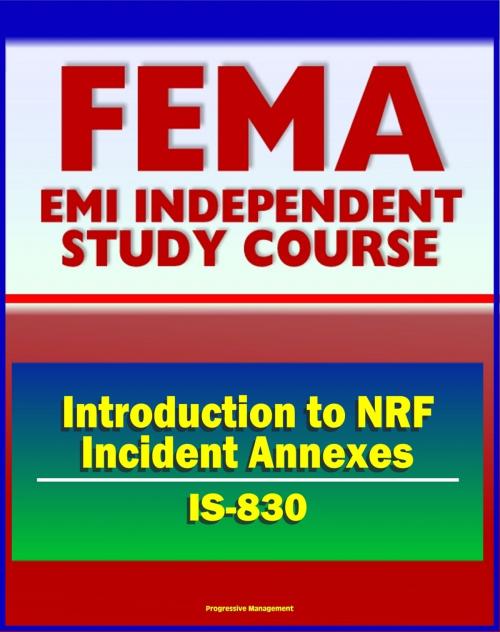21st Century FEMA Study Course: Introduction to NRF Incident Annexes (IS-830) - National Response Framework (NRF), Biological, Nuclear/Radiological, Mass Evacuation
Nonfiction, Social & Cultural Studies, Political Science| Author: | Progressive Management | ISBN: | 9781466141391 |
| Publisher: | Progressive Management | Publication: | July 16, 2011 |
| Imprint: | Smashwords Edition | Language: | English |
| Author: | Progressive Management |
| ISBN: | 9781466141391 |
| Publisher: | Progressive Management |
| Publication: | July 16, 2011 |
| Imprint: | Smashwords Edition |
| Language: | English |
This Federal Emergency Management Agency (FEMA) independent training course manual from the Emergency Management Institute (EMI) introduces the National Response Framework (NRF) incident annexes.
The National Response Framework (NRF) presents the guiding principles that enable all response partners to prepare for and provide a unified national response to disasters and emergencies from the smallest incident to the largest catastrophe.
As part of the NRF, Incident Annexes address the unique aspects of how we respond to seven broad incident categories (e.g., Biological, Nuclear/Radiological, Mass Evacuation). The overarching nature of functions described in these annexes frequently involves either support to or cooperation of all Federal departments and agencies involved in incident management efforts to ensure seamless integration of and transitions between preparedness, prevention, response, recovery, and mitigation activities.
Course Objectives - Upon completing this course, the participant will be able to:
Describe the purpose of the NRF Incident Annexes.
Identify the roles and responsibilities of response partners for supporting incident management.
Describe the coordinating procedures and mechanisms set forth in each NRF Incident Annex.
Primary Audience - This course is intended for government executives, private-sector and nongovernmental organization (NGO) leaders, and emergency management practitioners. This includes senior elected and appointed leaders, such as Federal department or agency heads, State Governors, mayors, tribal leaders, and city or county officials those who have a responsibility to provide for effective response.
This is a privately authored news service and educational publication of Progressive Management.
This Federal Emergency Management Agency (FEMA) independent training course manual from the Emergency Management Institute (EMI) introduces the National Response Framework (NRF) incident annexes.
The National Response Framework (NRF) presents the guiding principles that enable all response partners to prepare for and provide a unified national response to disasters and emergencies from the smallest incident to the largest catastrophe.
As part of the NRF, Incident Annexes address the unique aspects of how we respond to seven broad incident categories (e.g., Biological, Nuclear/Radiological, Mass Evacuation). The overarching nature of functions described in these annexes frequently involves either support to or cooperation of all Federal departments and agencies involved in incident management efforts to ensure seamless integration of and transitions between preparedness, prevention, response, recovery, and mitigation activities.
Course Objectives - Upon completing this course, the participant will be able to:
Describe the purpose of the NRF Incident Annexes.
Identify the roles and responsibilities of response partners for supporting incident management.
Describe the coordinating procedures and mechanisms set forth in each NRF Incident Annex.
Primary Audience - This course is intended for government executives, private-sector and nongovernmental organization (NGO) leaders, and emergency management practitioners. This includes senior elected and appointed leaders, such as Federal department or agency heads, State Governors, mayors, tribal leaders, and city or county officials those who have a responsibility to provide for effective response.
This is a privately authored news service and educational publication of Progressive Management.















